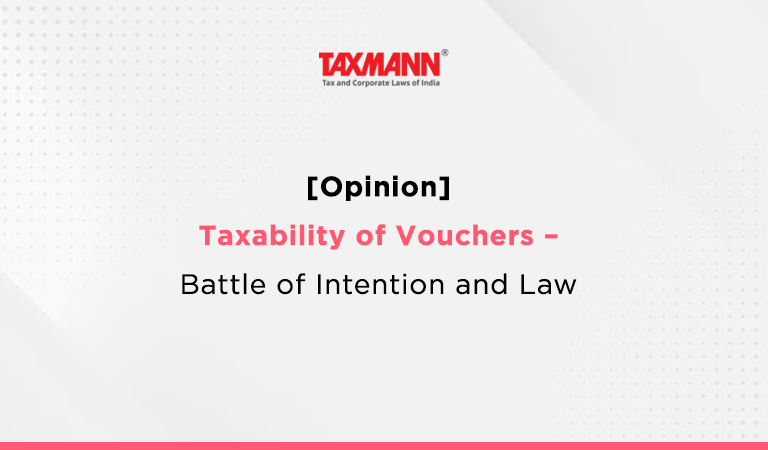[Opinion] Taxability of Vouchers – Battle of Intention and Law
- Blog|News|GST & Customs|
- 2 Min Read
- By Taxmann
- |
- Last Updated on 24 February, 2023

Deepak Suneja, Sourabh Kumar & Rahul Sharma – [2023] 147 taxmann.com 498 (Article)
India is rapidly marching towards becoming a digitally empowered society. India has an internet user base of approximately 700 million as of now, nearing 50 percent of its population. Internet users and usage has increased rapidly in recent years and in light of governments push for digital India movement this is expected to surge in future. Increase of internet users has led to increase in share of e-commerce in Indian market. Distribution or selling of vouchers is regular tradition in e-commerce industry which is being taken hand in hand by traditional market in recent times. Hence issue whether vouchers should be taxed or not became live and relevant in present time and it is very much important for it to be settled promptly otherwise this issue can also burgeon into a complex legal debate.
Taxability of vouchers has been a bone of contention since its inception. This issue remained unsettled in earlier tax regime, however the Goods and Services Tax Act (‘GST’) made an attempt to resolve the issue by defining vouchers at first place, no such definition was available in earlier regime.
The main issue annexed with taxability of vouchers is whether supply of voucher should be considered as an independent supply or it should be considered coupled with supply of underlying goods or services against that voucher.
This issue has again turned up with decision in case of Kalyan Jewellers India Limited. The authority ruled that Pre-paid Instruments (PPI’s) or gift vouchers shall be classified as goods and shall be taxed accordingly, independently from its underlying supply.
In this article we have made an attempt to delve into intricacies of voucher related provisions under GST Act and EU VAT Laws.
The Inception
GST Council in its 5th council meeting dated December 3, 2016 admitted that ‘voucher’ was not defined and it was not clear whether vouchers were good or services. The council agreed to define the term ‘voucher’ in definition section. This was the trigger point from where government intention to tax supply of vouchers can be sensed.
Although government intended to tax the supply of vouchers but then the question arises whether there are provisions in GST Act to tax vouchers. It is well settled from various legal precedents that to satisfy the levy four things should be mandatorily present in any transaction. First, person liable to tax which can be determined in present case. Second, rate of tax which can also be satisfied as even in absence of specific entry in rate notification, there are residual entries to rescue. Third, value on which rate of tax is to be applied, for vouchers this should also not be an issue as there is already specific valuation provisions prescribed for vouchers and Fourth, there should be a taxable event which is supply in GST. First 3 conditions can be satisfied with one or the another reason but moot question arises for the last condition whether transfer of voucher can be considered as an independent supply from supply of underlying goods or services.
Click Here To Read The Full Article
Disclaimer: The content/information published on the website is only for general information of the user and shall not be construed as legal advice. While the Taxmann has exercised reasonable efforts to ensure the veracity of information/content published, Taxmann shall be under no liability in any manner whatsoever for incorrect information, if any.

Taxmann Publications has a dedicated in-house Research & Editorial Team. This team consists of a team of Chartered Accountants, Company Secretaries, and Lawyers. This team works under the guidance and supervision of editor-in-chief Mr Rakesh Bhargava.
The Research and Editorial Team is responsible for developing reliable and accurate content for the readers. The team follows the six-sigma approach to achieve the benchmark of zero error in its publications and research platforms. The team ensures that the following publication guidelines are thoroughly followed while developing the content:
- The statutory material is obtained only from the authorized and reliable sources
- All the latest developments in the judicial and legislative fields are covered
- Prepare the analytical write-ups on current, controversial, and important issues to help the readers to understand the concept and its implications
- Every content published by Taxmann is complete, accurate and lucid
- All evidence-based statements are supported with proper reference to Section, Circular No., Notification No. or citations
- The golden rules of grammar, style and consistency are thoroughly followed
- Font and size that’s easy to read and remain consistent across all imprint and digital publications are applied



 CA | CS | CMA
CA | CS | CMA
